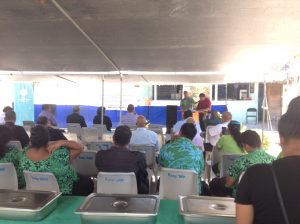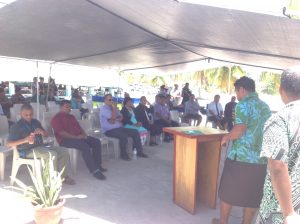TARAWA, KIRIBATI – September 3, 2020- Today the Government of Kiribati launched the Kiribati Agriculture Strategy (KAS 2020-2030) as an addendum to the Kiribati Vision 2020 (KV20), the country’s the long-term national development plan. The KAS was adopted by Cabinet in March 2020.
Held at the Kiribati House of Parliament, the launch event aimed to familiarize and communicate how the new KAS will help to develop a more climate-resilient agriculture sector and increase food security, livelihoods, household income, and job creation in the agriculture sector.
Agriculture is critical to Kiribati’s food security and provides significant employment in Kiribati, counting more than 4,110 employees

“Kiribati’s agriculture sector must continue to grow to meet the nutritional and health needs of our growing population,” said Timon Uation, Senior Assistant Secretary. “Developing a sustainable agriculture sector now is especially important as extreme weather conditions, and sea-level rise threatens agricultural production and livelihoods.”
The Kiribati Agriculture Strategy addresses food security, livelihood, employment, climate change challenges, and gender gaps, and aligns the agriculture sector to the other key policy frameworks in the country, including the KV20, the Kiribati Development Plan, and the Kiribati Climate Change Policy. The launch event called upon the diverse stakeholders to own and ensure accountability in the implementation process and achieve the overall goal.
The Ministry of Environment, Lands, and Agriculture Development (MELAD) developed the plan with the support of the Global Green Growth Institute (GGGI). Through diversified agricultural practices, the goal of the KAS is to contribute towards the national and global effort in poverty reduction, food security, gender equality, and climate mitigation.
GGGI will continue to support MELAD in developing an Action Framework to operationalize the Strategy and take steps toward implementation. As part of this work, 20 projects identified in the Strategy will be reviewed and prioritized for further project development and funding.

“Committed to supporting Kiribati achieve its development goals, GGGI is very pleased to see the Kiribati Agriculture Strategy launched and become a key platform to drive actions that increase jobs, food security, and climate-resilient agriculture,” said Semu K. Teffera, GGGI Program Officer in Kiribati.
GGGI will also provide institutional capacity building support to MELAD to enhance the application of appropriate project management, monitoring and evaluation systems and tools, and maximize results.